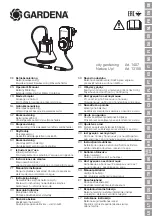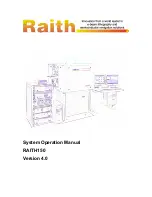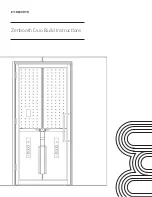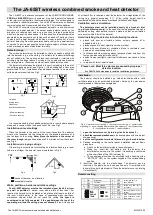
Small Peripheral Interface
This 8-bit interface is intended to allow external expansion to the processor board.
A56 and A53 (74HCT541 tri-state buffers) buffer the address and control lines, and
A62 (74HCT245, bi-directional tri-state buffers) buffer the data lines.
The address decoding is done on each peripheral board. The acknowledge for
each access is also done by the peripheral device, so that there is no restriction on
wait-states. The bus clock runs at 16mhz, and a reset line reinitializes the boards at
the same time as the CPU.
Four interrupt lines are also included in this interface, so that interrupt-driven
boards can be used (a good example is the 9300-4 GPIB/RS232 board, which uses
interrupts 2 and 3).
Serial Interface for on-board Peripherals
Two GALs (SEVERE and SAVEUR) are used to access serial on-board devices,
like the real time clock, option GAL, front panel and some parts of the acquisition
board. The principle of such a serial access is the following:
every write or read to the serial interface allows to write or read one bit (the MSB of
the byte). To write a byte to a serial device, you need eight accesses to the serial
interface.
Many serial devices need the same protocol: you first send a command byte (read,
write, clear, etc.), and then read or write one or several data (if required).
Depending on the address the serial interface is been accessed, the corresponding
device gets selected (_SSER, _SFPR, _SLED or SRTC lines). A clock (_SCKA), a
read data (SDRA or SDRD) and a write data (SDWA or SDWD) constitute the serial
interface itself (the D suffix on read and write data lines means Digital, i.e. devices
on the CPU board; an A suffix means devices on the Acquisition board).
RTC
The 68HC68T1 real time clock has several functions:
•
keep a time-of-the-day and current-date information while the DSO is not
powered on.
•
generate a 32kHz clock for DRAM refreshment.
•
generate a 128Hz periodic interrupt to force bus accesses from the processor
(otherwise the watchdog timer would time out and reset the board) and allow
periodic update of the time display (“scope alive”).
The chip uses it’s own 32.768kHz crystal to keep the time and derive all timings. A
few discrete components around it leave the chip powered by the backup lithium
battery while the rest of the board is not powered, and charge the battery when the
power is on again.
Front Panel
The front panel LED can be controlled by a serial write access. The LED (write
only) shares the same address as the option GAL (read only).
The LED is driven by the less significant bit (LSB) of the control register.
Watchdog and Reset Generation
Theory of Operation
4-7
Summary of Contents for LC564DL
Page 12: ...x Table of Contents ...
Page 18: ...2 4 General Information ...
Page 46: ...4 22 Theory of Operation 4 6 2 Power Supply Block Diagram ...
Page 59: ...Performance Verification 5 13 ...
Page 70: ...5 24 Performance Verification ...
Page 95: ...Performance Verification 5 49 ...
Page 115: ...Performance Verification 5 69 ...
Page 122: ...5 76 Performance Verification Figure 5 14 1MΩ Ω Ω Ω Rise time Equipment Setup ...
Page 148: ...6 14 Maintenance 6 6 4 Fan Problem ...
Page 149: ...6 6 5 Power Supply Voltages Problem Maintenance 6 15 ...
Page 150: ...6 16 Maintenance 6 6 6 Display Problem ...
Page 151: ...6 6 7 Front Panel Controls Do not Operate Maintenance 6 17 ...
Page 152: ...6 18 Maintenance 6 6 8 Remote Control GPIB or RS232 Problem ...
Page 153: ...6 6 9 Performance Verification Fails Maintenance 6 19 ...
Page 154: ...6 20 Maintenance 6 6 10 Floppy Disk Drive Problem ...
Page 155: ...6 6 11 Graphic Printer Problem Maintenance 6 21 ...
Page 156: ...6 22 Maintenance 6 6 12 Centronics Problem ...
Page 157: ...6 6 13 Hard Disk Drive Problem Maintenance 6 23 ...
Page 158: ...6 24 Maintenance ...
Page 181: ...Mechanical Parts 8 1 8 Mechanical Parts Figure 8 1 LC564DL Cabinet ...
Page 182: ...8 2 Mechanical Parts Figure 8 2 LC564DL Chassis Assembly ...
Page 184: ...8 4 Mechanical Parts Figure 8 3 Power Supply Installation ...
Page 185: ...Mechanical Parts 8 5 Figure 8 4 Lower Cover Assembly ...
Page 187: ...Mechanical Parts 8 7 Figure 8 5 Lower Cover Assembly with CKTRIG Option ...
Page 188: ...8 8 Mechanical Parts Figure 8 6 Lower Cover ...
Page 190: ...8 10 Mechanical Parts Figure 8 7 CKTRIG Option ...
Page 191: ...Mechanical Parts 8 11 Figure 8 8 Rear Panel Assembly ...
Page 193: ...Mechanical Parts 8 13 Figure 8 9 900079 Main Board Assembly ...
Page 194: ...8 14 Mechanical Parts Figure 8 10 900079 Main Board Assembly ...
Page 196: ...8 16 Mechanical Parts Figure 8 11 Upper Shield Assembly ...
Page 197: ...Mechanical Parts 8 17 Figure 8 12 Front Frame Assembly ...
Page 199: ...Mechanical Parts 8 19 Figure 8 13 Keypad Assembly ...
Page 200: ...8 20 Mechanical Parts Figure 8 14 Fan Assembly ...
Page 202: ...8 22 Mechanical Parts Figure 8 15 Graphic Printer Assembly ...
Page 203: ...Mechanical Parts 8 23 Figure 8 16 Upper Cover Assembly ...
Page 205: ...Mechanical Parts 8 25 Figure 8 17 Hard Disk Assembly ...
Page 206: ...8 26 Mechanical Parts Figure 8 18 Centronics VGA Interface Assembly ...
Page 207: ...Mechanical Parts 8 27 Figure 8 19 Floppy Disk Assembly ...
Page 209: ...Mechanical Parts 8 29 Figure 8 20 LC564DL Dimensions ...
Page 210: ...8 30 Mechanical Parts Figure 8 21 LC564DL Packaging ...
















































